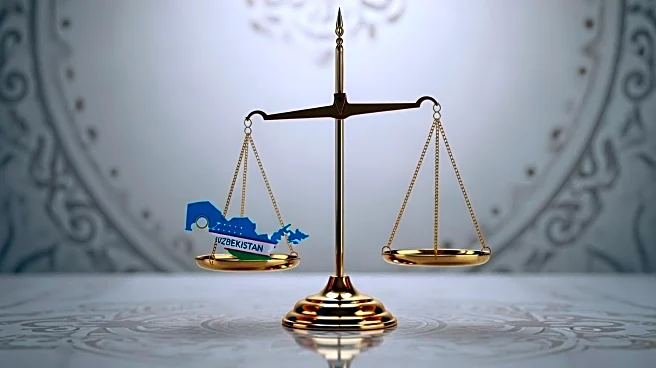What's Happening?
Uzbekistan is experiencing a significant increase in foreign investment, positioning itself as a rising financial hub in Central Asia. This transformation follows the death of former leader Islam Karimov
in 2016 and the subsequent reforms by President Shavkat Mirziyoyev. The country has opened its markets to global investors, attracting major financial institutions like Citibank and JPMorgan to its capital, Tashkent. The influx of investment is partly due to sanctions isolating Russia over its war in Ukraine, prompting investors to seek opportunities elsewhere. Uzbekistan's economy has doubled since 2020, driven by rising gold prices and a surge in foreign direct investment, which is expected to reach $42 billion this year.
Why It's Important?
The shift in investment dynamics highlights Uzbekistan's growing role in the regional economy, as it becomes a key destination for foreign capital. This development is significant for U.S. and European firms monitoring the region, as it opens new avenues for business and economic partnerships. The increase in foreign investment also underscores the geopolitical shifts in Central Asia, with China overtaking Russia as Uzbekistan's top financial partner. This change could influence regional stability and economic growth, impacting U.S. interests in the area. The reforms and economic growth in Uzbekistan may also serve as a model for other countries seeking to attract foreign investment.
What's Next?
Uzbekistan's continued economic growth and investment attraction will likely depend on its ability to execute its reform plans successfully. The country faces challenges such as political opposition and human rights concerns, which could affect investor confidence. President Mirziyoyev's constitutional changes allowing him to remain in power until 2037 may also impact the political landscape and economic policies. As Uzbekistan's fintech and digital payment sectors expand, further modernization and integration into the global economy are expected. The youthful population could drive innovation and economic development, presenting opportunities for international collaboration.
Beyond the Headlines
Uzbekistan's transformation from an isolated Soviet outpost to a financial hub reflects broader trends in global economic shifts. The country's ability to attract investment despite political and human rights challenges highlights the complex dynamics of emerging markets. The rise of fintech and digital payments symbolizes modernization, potentially leading to increased financial inclusion and economic empowerment. The geopolitical implications of Uzbekistan's growing ties with China and reduced reliance on Russia may influence regional power balances and U.S. foreign policy strategies.









